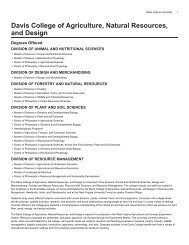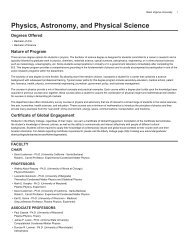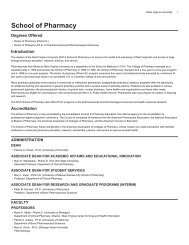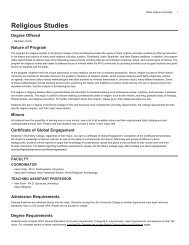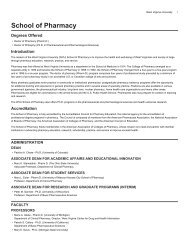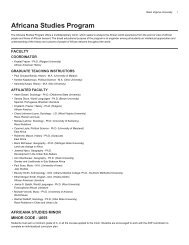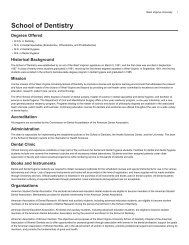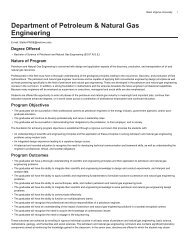Download PDF of this page - Catalogs - West Virginia University
Download PDF of this page - Catalogs - West Virginia University
Download PDF of this page - Catalogs - West Virginia University
You also want an ePaper? Increase the reach of your titles
YUMPU automatically turns print PDFs into web optimized ePapers that Google loves.
<strong>West</strong> <strong>Virginia</strong> <strong>University</strong> 1<br />
Environmental Geoscience<br />
Degrees Offered<br />
• Bachelor <strong>of</strong> Arts - Major: Environmental Geoscience<br />
Nature <strong>of</strong> Program<br />
The B.A. in environmental geoscience is a joint program in the Department <strong>of</strong> Geology and Geography for students interested in geological and<br />
geographical approaches to environmental issues. Emphasis is placed on the physical, human, and spatial aspects <strong>of</strong> Earth and its environment. The<br />
broad and interdisciplinary nature <strong>of</strong> the degree program is designed to produce geoscientists who can identify environmental problems, apply a variety<br />
<strong>of</strong> approaches to their remediation, and be conversant among the wide range <strong>of</strong> disciplines for which the environment is <strong>of</strong> special concern.<br />
The course requirements for the degree reflect the diversity <strong>of</strong> environmental problems that we face today from the atmosphere (air pollution), to the<br />
hydrosphere (water pollution), to the lithosphere (ground pollution), and how these problems affect our quality <strong>of</strong> life. The courses required for the degree<br />
also reflect the increased demands placed upon modern environmental scientists that include being able to recognize and understand the sources<br />
and impacts <strong>of</strong> various pollutants within the physical environment, being able to compile and analyze environmental data, understanding the regulatory<br />
aspects <strong>of</strong> environmental protection, and being able to effectively communicate issues <strong>of</strong> importance with other environmental scientists and with the<br />
general public.<br />
Graduates <strong>of</strong> <strong>this</strong> program will find employment in a wide array <strong>of</strong> fields including the assessment and remediation <strong>of</strong> environmental problems, landuse<br />
planning, geographic information systems, involvement in the legislative process by which laws are formulated to protect the environment, the<br />
application <strong>of</strong> such laws as part <strong>of</strong> a federal or state regulatory agency, or as a member <strong>of</strong> the journalistic community using the various methods <strong>of</strong> mass<br />
communication to increase the public awareness <strong>of</strong> situations that adversely affect the environment.<br />
Students who earn a degree in the Eberly College <strong>of</strong> Arts and Sciences must complete the <strong>University</strong> requirements, the College requirements for their<br />
specific degree program, and their major requirements.<br />
Minors<br />
All students have the possibility <strong>of</strong> earning one or more minors; please check the list <strong>of</strong> all available minors and their requirements (http://<br />
catalog.wvu.edu/undergraduate/minors). Please note that students may not earn a minor in their major field.<br />
Certificate <strong>of</strong> Global Engagement<br />
Students in the Eberly College, regardless <strong>of</strong> their major, can earn a Certificate <strong>of</strong> Global Engagement. Completion <strong>of</strong> the Certificate demonstrates<br />
the student’s knowledge <strong>of</strong> diverse cultures, as well as the ability to communicate and interact effectively with people <strong>of</strong> different cultural<br />
backgrounds. Students will be required to apply their knowledge <strong>of</strong> contemporary issues and global social contexts to their course work and their<br />
broader citizenship. For details regarding Certificate requirements, please visit the Eberly College <strong>page</strong> (http://catalog.wvu.edu/undergraduate/<br />
eberlycollege<strong>of</strong>artsandsciences/#otherdegreestext).<br />
FACULTY<br />
CHAIR<br />
• J. Steven Kite - Ph.D. (<strong>University</strong> <strong>of</strong> Wisconsin)<br />
PROFESSORS<br />
• Robert E. Behling - Ph.D. (Ohio State <strong>University</strong>)<br />
Geomorphology<br />
• Timothy Carr - Ph.D.<br />
Sedimentary & Petroleum Geology<br />
• Joseph J. Donovan - PhD<br />
Hydrogeology<br />
• Gregory Elmes - Ph.D. (Pennsylvania State <strong>University</strong>)<br />
GIScience<br />
• Trevor M. Harris - Ph.D. (<strong>University</strong> <strong>of</strong> Hull)<br />
Eberly Pr<strong>of</strong>essor, Geographic Information science<br />
• Amy E. Hessl - Ph.D. (<strong>University</strong> <strong>of</strong> Arizona)<br />
Biogeography, Forest ecosystems<br />
• Thomas W. Kammer - Ph.D. (Indiana <strong>University</strong>)
2 Environmental Geoscience<br />
Centennial Pr<strong>of</strong>essor <strong>of</strong> Paleontology<br />
• Henry W. Rauch - Ph.D. (Pennsylvania State <strong>University</strong>)<br />
Hydrogeology, geochemistry<br />
• John J. Renton - Ph.D.<br />
Geochemistry<br />
• Timothy A. Warner - Ph.D. (Purdue <strong>University</strong>)<br />
Remote Sensing<br />
• Thomas H. Wilson - Ph.D. (<strong>West</strong> <strong>Virginia</strong> <strong>University</strong>)<br />
Geophysics<br />
ASSOCIATE PROFESSORS<br />
• Kathy Benison - Ph.D. (<strong>University</strong> <strong>of</strong> Kansas)<br />
Sedimentology and low-temperature geochemistry<br />
• Dengliang Gao - Ph.D. (Duke <strong>University</strong>)<br />
Geophysics<br />
• Helen M. Lang - Ph.D.<br />
Mineralogy and Metamorphic Petrology<br />
• Jaime Toro - Ph.D.<br />
Structural Geology, Tectonics<br />
• Dorothy J. Vesper - Ph.D. (Pennsylvania State <strong>University</strong>)<br />
Aqueous geochemistry, Hydrogeology<br />
ASSISTANT PROFESSORS<br />
• Joseph Lebold - Ph.D.<br />
Geology education<br />
• Eungul Lee - Ph.D. (<strong>University</strong> <strong>of</strong> Colorado)<br />
Climate, Physical Geography<br />
• Brenden McNeil - Ph.D. (Syracuse <strong>University</strong>)<br />
GIScience, Environmental Modeling<br />
• Shikha Sharma - Ph.D.<br />
Isotope Geochemistry<br />
• Amy Weislogel - Ph.D. (Stanford <strong>University</strong>)<br />
Sedimentary geology<br />
PROFESSORS EMERITI<br />
• Kenneth C. Martis - Ph.D. (<strong>University</strong> <strong>of</strong> Michigan)<br />
Electoral Geography<br />
• Richard Smosna - Ph.D. (<strong>University</strong> <strong>of</strong> Illinois)<br />
Oceanography & Carbonate Rocks<br />
CLINICAL ASSISTANT PROFESSOR<br />
• Rick Landenberger - Ph.D.<br />
Remote Sensing the Environment<br />
PROF-DOC<br />
• Jonathan Hall - Ph.D.<br />
Ecology, Arid systems<br />
• Maria Perez - Ph.D. (<strong>University</strong> <strong>of</strong> Michigan)<br />
Human Geography, Science & Society, Speleology, Latin America<br />
Admission<br />
Incoming Freshmen are admitted directly into the Environmental Geoscience major. Students coming from <strong>University</strong> College or another unit must be in<br />
good standing (2.00 overall GPA).
<strong>West</strong> <strong>Virginia</strong> <strong>University</strong> 3<br />
Degree Requirements<br />
Students must complete WVU General Education Curriculum requirements, College B.A. requirements, major requirements, and electives to total<br />
120 hours. For complete details on these requirements, visit the B.A. Degrees tab on the Eberly College <strong>of</strong> Arts and Sciences (http://catalog.wvu.edu/<br />
undergraduate/eberlycollege<strong>of</strong>artsandsciences/#bachelor<strong>of</strong>artstext) <strong>page</strong>.<br />
Departmental Requirements for the B.A. in Environmental Geoscience<br />
All students wishing to obtain a degree in Environmental Geoscience must comply with the following:<br />
• Calculation <strong>of</strong> the GPA in the Major: Students must have a 2.0 in all courses listed in the requirements for the Environmental Geoscience major.<br />
• Writing Course Requirement: The General Education Curriculum requires the successful completion <strong>of</strong> a writing course ("W"), preferably in the<br />
major. Majors in Environmental Geoscience are encouraged to take:GEOL 400.<br />
• Capstone Requirement: The General Education Curriculum requires the successful completion <strong>of</strong> a Capstone course: GEOL 400.<br />
• Benchmarks expectations: By end <strong>of</strong> their 4th semester in the major, students should have successfully completed 8 hours <strong>of</strong> introductory<br />
GEOL sequences; GEOL 200; GEOG 106-107; MATH 128; and one <strong>of</strong> the following: CHEM 111 or CHEM 115. All majors must meet with a G&G<br />
department adviser each semester. Students who do no meet these milestones may be removed from their major until they remedy their deficiencies.<br />
GENERAL EDUCATION CURRICULUM<br />
Please use <strong>this</strong> link to view a list <strong>of</strong> courses that meet each GEC requirement. (http://registrar.wvu.edu/current_students/<br />
general_education_curriculum)<br />
NOTE: Some major requirements will fulfill specific GEC requirements. Please see the curriculum requirements listed below for details on which GECs<br />
you will need to select.<br />
General Education Curriculum<br />
ENGL 101<br />
& ENGL 102<br />
or ENGL 103<br />
Composition And Rhetoric<br />
and Composition And Rhetoric<br />
Accelerated Academic Writing<br />
GEC 2A - Mathematics 3-4<br />
GEC 2B - Natural and Physical Science 7-8<br />
GEC 2C - Additional GEC 2A, B or C 3<br />
GEC 3 - The Past and Its Traditions 3<br />
GEC 4 - Issues <strong>of</strong> Contemporary Society 3<br />
GEC 5 - Artistic Expression 3<br />
GEC 6 - The Individual in Society 3<br />
GEC 6F - First Year Seminar 1-3<br />
GEC 7 - American Culture 3<br />
GEC 8 - <strong>West</strong>ern Culture 3<br />
GEC 9 - Non-<strong>West</strong>ern Culture 3<br />
Total Hours 38-45<br />
Curriculum Requirements<br />
UNIVERSITY REQUIREMENTS 30<br />
WVUE 191<br />
or GEOG 199<br />
First Year Seminar<br />
Orientation To Geography<br />
GEC : number <strong>of</strong> courses may vary depending on overlap<br />
COLLEGE REQUIREMENTS 12<br />
Foreign Language<br />
DEPARTMENTAL REQUIREMENTS<br />
A minimum GPA <strong>of</strong> 2.0 is required in all courses<br />
Foundation Courses: 4<br />
Select one <strong>of</strong> the following:<br />
GEOL 110<br />
& GEOL 111<br />
Environmental Geoscience<br />
and Environmental Geoscience Lab<br />
3-6
4 Environmental Geoscience<br />
GEOG 110<br />
& GEOG 111<br />
GEOL 101<br />
& GEOL 102<br />
Environmental Geoscience<br />
and Environmental Geoscience Lab<br />
Planet Earth<br />
and Planet Earth Laboratory<br />
Math Requirement: 3<br />
Select one from the following:<br />
MATH 128<br />
MATH 150<br />
MATH 153<br />
& MATH 154<br />
Plane Trigonometry<br />
Applied Calculus<br />
MATH 155 Calculus 1<br />
Calculus 1a with Precalculus<br />
and Calculus 1b with Precalculus<br />
Basic Science Requirement: 12<br />
BIOL 105<br />
& BIOL 106<br />
CHEM 111<br />
or CHEM 115<br />
PHYS 101<br />
or PHYS 105<br />
Environmental Biology<br />
and Environmental Biology Lab<br />
Survey <strong>of</strong> Chemistry<br />
Fundamentals <strong>of</strong> Chemistry<br />
Introductory Physics<br />
Conceptual Physics<br />
Core Courses: 21<br />
GEOL 103<br />
& GEOL 104<br />
GEOG 107<br />
& GEOG 106<br />
GEOL 200<br />
GEOG 205<br />
GEOG 207<br />
GEOG 307<br />
Earth Through Time<br />
and Earth Through Time Laboratory<br />
Physical Geography<br />
and Physical Geography Laboratory<br />
Geology for Environ Scientists<br />
Natural Resources<br />
Climate And Environment<br />
Biogeography:Theory and Method<br />
Methods Course: 3<br />
Choose one:<br />
GEOG 300<br />
GEOG 350<br />
GEOG 407<br />
GEOG 455<br />
GEOL 455<br />
Geographical Data Analysis<br />
Geographic Info Systms/Science<br />
Environmental Field Geography<br />
Introduction to Remote Sensing<br />
Introduction to Remote Sensing<br />
Elective Geology and Geography Courses 12<br />
Select four courses from the following list. Other courses can be added to <strong>this</strong> list with approval from an Environmental Geoscience faculty<br />
advisor.:<br />
GEOG 150<br />
GEOG 415<br />
GEOG 452<br />
GEOG 453<br />
GEOG 454<br />
GEOG 321<br />
or GEOL 321<br />
GEOL 203<br />
GEOL 365<br />
GEOL 463<br />
GEOL 484<br />
GEOL 488<br />
Digital Earth (methods course)<br />
Global Environmental Change<br />
GIS:Applications (methods course)<br />
GIS:Design and Implementation (methods course)<br />
Environmental GIS (methods course)<br />
Geomorphology<br />
Geomorphology<br />
Physical Oceanography<br />
Environmental Geology<br />
Physical Hydrogeology<br />
Minerals and the Environment<br />
Environmental Geochemistry<br />
Electives Non-Geology/Geography 12<br />
Select four (4) courses from the following list. Other courses can be added to <strong>this</strong> list with approval from an Environmental Geoscience faculty<br />
advisor.<br />
ARE 187<br />
Energy Resource
<strong>West</strong> <strong>Virginia</strong> <strong>University</strong> 5<br />
ARE 220<br />
ARE 382<br />
ART 380<br />
AGRN 202<br />
& AGRN 203<br />
AGRN 455<br />
BIOL 117<br />
BIOL 101<br />
& BIOL 103<br />
BIOL 102<br />
& BIOL 104<br />
BIOL 115<br />
BIOL 221<br />
BIOL 302<br />
BIOL 353<br />
BIOL 361<br />
BIOL 363<br />
BIOL 463<br />
CHEM 231<br />
CS 101<br />
CS 110<br />
FMAN 212<br />
FMAN 222<br />
FMAN 433<br />
ENVP 119<br />
ENVP 155<br />
ENVP 355<br />
ENVP 401<br />
ENVP 412<br />
ENVP 415<br />
ENVP 420<br />
ENVP 425<br />
ENVP 451<br />
ENVP 455<br />
ENVP 460<br />
FHYD 444<br />
FHYD 454<br />
PHIL 310<br />
POLS 338<br />
LARC 105<br />
RPTR 142<br />
RPTR 239<br />
RESM 140<br />
RESM 480<br />
STAT 211<br />
STAT 312<br />
WMAN 150<br />
WMAN 160<br />
WMAN 313<br />
WMAN 314<br />
WMAN 421<br />
WDSC 100<br />
WDSC 223<br />
Intro Envirnmntl/Resource Econ<br />
Agri and Natural Resources Law<br />
Art and Environment<br />
Principles <strong>of</strong> Soil Science<br />
and Principles <strong>of</strong> Soil Science Lab<br />
Reclamation <strong>of</strong> Disturbed Soils<br />
Introductory Physiology<br />
General Biology<br />
and General Biology Laboratory<br />
General Biology<br />
and General Biology Laboratory<br />
Principles <strong>of</strong> Biology<br />
Ecology And Evolution<br />
Biometry<br />
Flora Of <strong>West</strong> <strong>Virginia</strong><br />
Plant Ecology<br />
Plant Geography<br />
Global Ecology<br />
Organic Chemistry:Brief Course<br />
Intro-Computer Applications<br />
Introduction-Computer Science<br />
Forest Ecology<br />
Forest Mensuration<br />
Forest Management<br />
Soil in the City<br />
Elements-Environmtl Protection<br />
Environmentl Sampling/Analysis<br />
Environmental Microbiology<br />
Pest Management<br />
Hazardous Waste Training<br />
Soil Microbiology<br />
Environmental Soil Management<br />
Principles <strong>of</strong> Weed Science<br />
Reclamation <strong>of</strong> Disturbed Soils<br />
Environmental Impact Assessmnt<br />
Watershed Management<br />
Field Watershed Hydrology<br />
Philosophy <strong>of</strong> Science<br />
Environmental Policy<br />
Intro:Landscape Architecture<br />
Intro:Recreation/Parks/Tourism<br />
Sustainable Tourism Developmnt<br />
Sustainable Living<br />
Environmental Regulation<br />
Elemntry Statistical Inference<br />
Intermediate Statistcl Methods<br />
Principle-Conservation Ecology<br />
Ecology <strong>of</strong> Invading Species<br />
Wildlife Ecosystem Ecology<br />
Marine Ecology<br />
Renwabl Resourcs Policy/Govrnc<br />
Forest Resources in US History<br />
Wood Anatomy and Structure
6 Environmental Geoscience<br />
Capstone 4<br />
GEOL 400<br />
Environmental Practicum (capstone and writing course)<br />
GENERAL ELECTIVES 7<br />
Number <strong>of</strong> electives may vary depending on overlap<br />
Total Hours 120<br />
Suggested Plan <strong>of</strong> Study<br />
First Year<br />
Fall Hours Spring Hours<br />
Foreign Language 3 Foreign Language 3<br />
GEC 6 GEOL 103 3<br />
GEOL 110 or 101 3 GEOL 104 1<br />
GEOL 111 or 102 1 GEOG 199 or WVUE 191 1<br />
GEOG 107 3 Math Requirement 3<br />
GEOG 106 1 Biology Requirement 4<br />
Second Year<br />
17 15<br />
Fall Hours Spring Hours<br />
Foreign Language 3 Foreign Language 3<br />
GEC 3 GEC 3<br />
GEOL 200 4 GEOG 205 3<br />
GEOG 207 3 GEOL/GEOG Elective 3<br />
Chemistry Requirement 4 Physics requirement 4<br />
Third Year<br />
17 16<br />
Fall Hours Spring Hours<br />
GEC 8 GEC 3<br />
GEOL/GEOG Elective 3 GEOG 307 3<br />
Non-GEOL/GEOG Elective 3 GEOL/GEOG Elective 3<br />
Fourth Year<br />
Non-GEOL/GEOG Electives 6<br />
14 15<br />
Fall Hours Spring Hours<br />
GEC 3 GEOL 400 4<br />
GEOG/GEOL Electives 6 Non-GEOL/GEOG Elective 3<br />
Non-GEOL/GEOG Elective 3 General Electives 7<br />
Total credit hours: 120<br />
GEOGRAPHY COURSES<br />
12 14<br />
GEOG 102. World Regions. 3 Hours.<br />
Comparison and relationships <strong>of</strong> world regions. Geographical perspectives <strong>of</strong> contemporary global problems. Developing regions contrasted with<br />
modernized regions and the consequences <strong>of</strong> their interactions.<br />
GEOG 106. Physical Geography Laboratory. 1 Hour.<br />
PR or CONC: GEOG 107.<br />
GEOG 107. Physical Geography. 3 Hours.<br />
Introduction to global environmental systems operating on the earth’s surface, emphasizing weather and climate, soils, natural vegetation, and<br />
geomorphology, and examination <strong>of</strong> human interaction with these natural processes.<br />
GEOG 108. Human Geography. 3 Hours.<br />
Introduction to geographical dimension in human behavior and the human altered landscape including social, demographic, economic, and political<br />
attributes <strong>of</strong> societies.
<strong>West</strong> <strong>Virginia</strong> <strong>University</strong> 7<br />
GEOG 110. Environmental Geoscience. 3 Hours.<br />
Physical aspects <strong>of</strong> the earth with emphasis on natural resources, environmental degradation and hazards. Registration in GEOG 111 meets<br />
requirements for a 4-hr. credit in laboratory science. (Also listed as GEOL 110.) (Students may not receive credit for GEOG 110 and GEOL 101 or GEOL<br />
110.).<br />
GEOG 111. Environmental Geoscience Lab. 1 Hour.<br />
PR or Conc: GEOG 110. (Also listed as GEOL 111.) (Students not receive credit for GEOG 111 and GEOL 102 or GEOL 111.).<br />
GEOG 149. Digital Earth Lab. 1 Hour.<br />
Introduction to geographic information systems s<strong>of</strong>tware using basic principles <strong>of</strong> mapping and analysis <strong>of</strong> geographic information.<br />
GEOG 150. Digital Earth. 3 Hours.<br />
PR or CONC: GEOG 149. Recent advances in technology and data availability have increased our knowledge about the world. This class surveys key<br />
concepts <strong>of</strong> geospatial technologies (GIS, remote sensing, spatial analysis) in the context <strong>of</strong> social and environmental change.<br />
GEOG 199. Orientation To Geography. 1 Hour.<br />
For majors, pre-majors, and potential majors; discussion <strong>of</strong> the discipline, curriculum requirements, areas <strong>of</strong> specialization, internships and career<br />
opportunities. (1 hr. lec., pass/fail only.).<br />
GEOG 205. Natural Resources. 3 Hours.<br />
Introduces the concept <strong>of</strong> natural resources and surveys such topics as land, soil, rangeland, forests, water, atmosphere, minerals, and energy.<br />
Emphasis is on the United States within the context <strong>of</strong> the global environment.<br />
GEOG 207. Climate And Environment. 3 Hours.<br />
Examination <strong>of</strong> atmospheric processes and the impact <strong>of</strong> human activity on climate.<br />
GEOG 209. Economic Geography. 3 Hours.<br />
PR: GEOG 108. Examination <strong>of</strong> the world economy particularly the spatial patterns <strong>of</strong> agriculture, manufacturing and services.<br />
GEOG 210. Urban Geography. 3 Hours.<br />
PR: GEOG 101 or GEOG 102 or GEOG 108. Introduction to the geography <strong>of</strong> the city incorporating consideration <strong>of</strong> urban systems and city-region<br />
linkages, patterns and processes <strong>of</strong> urban land use, the social geography <strong>of</strong> the city, and contemporary urban problems.<br />
GEOG 215. Population Geography. 3 Hours.<br />
PR: GEOG 107. Study <strong>of</strong> the geographic distribution <strong>of</strong> population and population characteristics including density, age, fertility, mortality, and settlement<br />
patterns. Problems <strong>of</strong> migration and population/resource issues are also covered, with an emphasis on developing countries.<br />
GEOG 240. United States and Canada. 3 Hours.<br />
Regional study <strong>of</strong> the United States and Canada emphasizing such geographic features as climate, natural vegetation, topography, natural resources,<br />
population distribution and trends, agriculture, manufacturing, transportation systems, and regional culture.<br />
GEOG 241. Geography <strong>of</strong> Europe. 3 Hours.<br />
PR: GEOG 108. Study <strong>of</strong> contemporary human and physical geography <strong>of</strong> Europe. Insight to political, economic and social dimensions <strong>of</strong> transition in<br />
<strong>this</strong> region.<br />
GEOG 243. Geography <strong>of</strong> Africa. 3 Hours.<br />
Systematic and regional characteristics and geographic problems <strong>of</strong> political, social, and economic development.<br />
GEOG 244. Geography <strong>of</strong> the Middle East. 3 Hours.<br />
This course is designed to provide students with a detailed understanding and ability to analyze the geography <strong>of</strong> the Middle East (including North<br />
Africa). Special topics on current geographical issues will also be covered.<br />
GEOG 293A-Z. Special Topics. 1-6 Hours.<br />
PR: Consent. Investigation <strong>of</strong> topics not covered in regularly scheduled courses.<br />
GEOG 298A-Z. Honors. 1-3 Hours.<br />
PR: Students in Honors Program and consent from the honors director. Independent reading, study, or research.<br />
GEOG 300. Geographical Data Analysis. 3 Hours.<br />
Quantitative techniques for collection, classification, and spatial analysis <strong>of</strong> geographical data with emphasis on map analysis and application <strong>of</strong> spatial<br />
statistics.<br />
GEOG 302. Political Geography. 3 Hours.<br />
Examines the interrelationship between politics and the environment, human territoriality, the political organization <strong>of</strong> space, geopolitical aspects <strong>of</strong> the<br />
nation-state and international problems.<br />
GEOG 307. Biogeography:Theory and Method. 3 Hours.<br />
PR: GEOG 107. An introduction to the field <strong>of</strong> biogeography including the study <strong>of</strong> the distribution and diversity <strong>of</strong> life, how species migrate, the<br />
importance <strong>of</strong> natural and human disturbances in ecosystems.<br />
GEOG 310. Global Issues. 3 Hours.<br />
PR: GEOG 102 or GEOG 108. Themes <strong>of</strong> spatial equity and justice in an increasingly interdependent world system. Contemporary issues concerning<br />
location, place, movement, and region.
8 Environmental Geoscience<br />
GEOG 317. Climatological Analysis. 3 Hours.<br />
PR: GEOG 207 or Consent. Statistical analysis and interpretation <strong>of</strong> climatological data and application to physical and human problems across the<br />
globe using user-friendly tools. (Also listed as GEOG 517).<br />
GEOG 321. Geomorphology. 3 Hours.<br />
PR: GEOL 101 and GEOL 102. An examination <strong>of</strong> earth-surface processes and landforms, with emphasis on environmental geomorphology, streams,<br />
floods, glaciers, and landslides. (Required field trip at student’s expense; also listed as GEOL 321.).<br />
GEOG 350. Geographic Info Systms/Science. 4 Hours.<br />
Explores concepts, principles and practice <strong>of</strong> acquiring, storing, analyzing, display and use <strong>of</strong> geographic information.<br />
GEOG 361. Cartography. 3 Hours.<br />
An introduction to mapping from concepts to production, including historical developments, coordinate systems, projections, generalization,<br />
symbolization, map design and computer- assisted mapping. (2 hr. lec., 1 hr. lab.).<br />
GEOG 393A-Z. Special Topics. 1-6 Hours.<br />
PR: Consent. Investigation <strong>of</strong> topics not covered in regularly scheduled courses.<br />
GEOG 407. Environmental Field Geography. 3 Hours.<br />
PR: GEOG 107 and GEOG 307. An introduction to field methods used in environmental and physical geography. Course uses a problem based<br />
approach.<br />
GEOG 411. Rural and Regional Development. 3 Hours.<br />
PR: GEOG 102 or GEOG 108. An investigation into rural and regional development in developed and underdeveloped regions. The relationship between<br />
development theory and policy is explored.<br />
GEOG 412. Geography <strong>of</strong> Gender. 3 Hours.<br />
PR: GEOG 108 or consent. An exploration <strong>of</strong> how gender affects spatial patterns and processes. Theoretical and empirical aspects <strong>of</strong> feminism are<br />
analyzed including women and employment, third world feminism, sexuality and space, and gender in academia.<br />
GEOG 415. Global Environmental Change. 3 Hours.<br />
PR: GEOG 107 or equivalent or consent. A geographic analysis <strong>of</strong> the Earth system emphasizing the interdependence and feedback mechanisms <strong>of</strong> the<br />
hydrologic cycle, ecosystems, climate, and human activities.<br />
GEOG 425. Urban/Regional Planning. 3 Hours.<br />
PR: GEOG 210 or POLS 220 or consent. Explores concepts, techniques, and processes <strong>of</strong> physical and socioeconomic planning and their application to<br />
urban and regional problems.<br />
GEOG 443. African Environment & Devlpmnt. 3 Hours.<br />
Detailed examination <strong>of</strong> the intersection <strong>of</strong> environmental and development studies in sub-Saharan Africa with critical assessments <strong>of</strong> current practice.<br />
GEOG 452. GIS:Applications. 3 Hours.<br />
PR: GEOG 350. GIS uses, needs, analysis, design, and implementation. Operational institutional and management topics <strong>of</strong> GIS for planning, locational<br />
decision making in business, government, and research contexts. (2 hr. lec., 1 hr. lab.) (Also listed as GEOL 452.).<br />
GEOG 453. GIS:Design and Implementation. 3 Hours.<br />
PR: GEOG 350 and consent. Geographic database design and implementation using contemporary GIS s<strong>of</strong>tware.<br />
GEOG 454. Environmental GIS. 3 Hours.<br />
Provides background and hands-on experience needed to answer scientific questions about the environment within a raster-based GIS framework.<br />
Students should have introductory-level GIS background.<br />
GEOG 455. Introduction to Remote Sensing. 3 Hours.<br />
Theory, technology and applications <strong>of</strong> photo-interpretation and digital image analysis <strong>of</strong> aerial photography and multispectral images. (2 hr. lec., 1 hr.<br />
lab.) (Also listed as GEOL 455.).<br />
GEOG 456. Remote Sensing Applications. 3 Hours.<br />
PR: GEOG 455 or GEOL 455 or consent. Survey <strong>of</strong> remote sensing applications, focusing on the type <strong>of</strong> information obtained and methods used.<br />
GEOG 462. Digital Cartography. 3 Hours.<br />
PR: GEOG 361 or consent. Computer-assisted mapping emphasizing the appropriate uses <strong>of</strong> s<strong>of</strong>tware in thematic and topographic map design,<br />
annotation, symbolization, color, design, display and reproduction.<br />
GEOG 463. Crime Geography. 3 Hours.<br />
PR: GEOG 150 or GEOG 350. Exploring the interactions between crime, society, and space through GIS, mapping, and geographical concepts <strong>of</strong> crime<br />
and law enforcement.<br />
GEOG 485. Methods Geographic Research. 3 Hours.<br />
PR: Consent. Geographic analysis as problem-solving activity. Practical experience in field techniques, library research, hypothesis formation and<br />
testing, and report preparation and presentation. Students will acquire skills in literary and numerical approaches to geographic data analysis.<br />
GEOG 490. Teaching Practicum. 1-3 Hours.<br />
PR: Consent. Teaching practice as a tutor or assistant.
<strong>West</strong> <strong>Virginia</strong> <strong>University</strong> 9<br />
GEOG 491. Pr<strong>of</strong>essional Field Experience. 1-18 Hours.<br />
PR: Consent. (May be repeated up to a maximum <strong>of</strong> 18 hours.) Prearranged experiential learning program, to be planned, supervised, and evaluated for<br />
credit by faculty and field supervisors. Involves temporary placement with public or private enterprise for pr<strong>of</strong>essional competence development.<br />
GEOG 492A-Z. Directed Study. 1-3 Hours.<br />
Directed study, reading, and/or research.<br />
GEOG 493A-Z. Special Topics. 1-6 Hours.<br />
PR: Consent. Investigation <strong>of</strong> topics not covered in regularly scheduled courses.<br />
GEOG 494A-Z. Seminar. 1-3 Hours.<br />
PR: Consent. Presentation and discussion <strong>of</strong> topics <strong>of</strong> mutual concern to students and faculty.<br />
GEOG 495. Independent Study. 1-6 Hours.<br />
Faculty supervised study <strong>of</strong> topics not available through regular course <strong>of</strong>ferings.<br />
GEOG 496. Senior Thesis:Capstone. 0-3 Hours.<br />
PR: Consent.<br />
GEOG 497. Research. 1-15 Hours.<br />
PR: Consent. Research activities leading to thesis, problem report, research paper or equivalent scholarly project, or a dissertation. (Grading may be S/<br />
U.).<br />
GEOG 498A-Z. Honors. 1-3 Hours.<br />
PR: Students in Honors Program and consent by the honors director. Independent reading, study or research.<br />
GEOG 499A-Z. Global Service Learning. 3-6 Hours.<br />
PR: Departmental consent. Thesis proposal, writing, and defense for students admitted to the Honors Program.<br />
GEOLOGY COURSES<br />
GEOL 101. Planet Earth. 3 Hours.<br />
Composition and structure <strong>of</strong> the Earth and the physical processes that change Earth’s surface. GEOL 102 not required with GEOL 101. (Accompanied<br />
by registration in GEOL 102, class meets requirements for 4 hr. credit in a laboratory science in geology.) (Students cannot receive credit for GEOL 101<br />
and GEOL 110 or GEOG 110.).<br />
GEOL 102. Planet Earth Laboratory. 1 Hour.<br />
PR or CONC: GEOL 101. Laboratory study <strong>of</strong> the Earth using rocks, minerals and maps. (2 hr. lab.) (Students cannot receive credit for GEOL 102 and<br />
GEOL 111 or GEOG 111.).<br />
GEOL 103. Earth Through Time. 3 Hours.<br />
PR: GEOL 101 or GEOL 110 or GEOG 110. Evolution <strong>of</strong> the Earth and its inhabitants. (Accompanied by registration in GEOL 104, class meets<br />
requirements for 4 hr. credit in a laboratory science in geology.).<br />
GEOL 104. Earth Through Time Laboratory. 1 Hour.<br />
PR or CONC: GEOL 103. Laboratory study <strong>of</strong> sedimentary rocks, fossils, and geologic maps and their use in interpreting Earth history. (2 hr. lab.).<br />
GEOL 110. Environmental Geoscience. 3 Hours.<br />
Physical aspects <strong>of</strong> the Earth with emphasis on natural resources, environmental degradation and hazards. (Accompanied by GEOL 111 meets<br />
requirements for a 4 hr. credit in laboratory science.) (Also listed as GEOG 110.) (Students may not receive credit for GEOL 110 and GEOG 110 or<br />
GEOL 101.).<br />
GEOL 111. Environmental Geoscience Lab. 1 Hour.<br />
PR or CONC: GEOL 110. (Also listed as GEOG 111.) (Students may not receive credit for GEOG 111 and GEOL 102 or GEOG 111.).<br />
GEOL 200. Geology for Environ Scientists. 4 Hours.<br />
PR: (GEOL 110 and GEOL 111) or (GEOG 110 and GEOG 111) or (GEOL 101 and GEOL 102 and GEOL 103 and GEOL 104). Fundamentals <strong>of</strong><br />
mineralogy, sedimentation, stratigraphy, petrology, and structural geology needed by environmental scientists to understand earth materials. (Required<br />
field trips partial student expense.) (3 hr. lec., 1 hr. lab.).<br />
GEOL 203. Physical Oceanography. 3 Hours.<br />
(Not open to upper division geology majors.) The geography and geology <strong>of</strong> ocean basins and margins, the chemical and physical properties <strong>of</strong> sea<br />
water, and the examination <strong>of</strong> the source and location <strong>of</strong> resources in the sea.<br />
GEOL 230. Fossils and Evolution. 3 Hours.<br />
PR: GEOL 101 or BIOL 101. Evolutionary history <strong>of</strong> plants, marine invertebrates, fish, amphibians, reptiles, dinosaurs, birds, and mammals; emphasis<br />
on unique contribution <strong>of</strong> fossil record to evolutionary theory. (2 hr. lec., 1 hr. lab.) (Credit cannot be obtained for both GEOL 103 and GEOL 230.).<br />
GEOL 284. Mineralogy. 3 Hours.<br />
PR: GEOL 101 and GEOL 102 and PR or CONC: CHEM 111 or CHEM 115. Elements <strong>of</strong> crystallography and the systematic study <strong>of</strong> minerals,<br />
identification <strong>of</strong> minerals in hand specimens according to physical properties. (Required weekend field trip covered by the lab fee.).
10 Environmental Geoscience<br />
GEOL 285. Introductory Petrology. 3 Hours.<br />
PR: GEOL 284. Introduction to the study <strong>of</strong> igneous, sedimentary and metamorphic rocks, including mineralogy, processes <strong>of</strong> formation, tectonic setting,<br />
and description and identification <strong>of</strong> rocks in hand specimens. (Required weekend field trip. Students will be required to pay a portion <strong>of</strong> the expenses.).<br />
GEOL 293A-Z. Special Topics. 1-6 Hours.<br />
GEOL 300. Geology <strong>of</strong> <strong>West</strong> <strong>Virginia</strong>. 3 Hours.<br />
PR: GEOL 103 and GEOL 104. Journey through geologic history <strong>of</strong> <strong>West</strong> <strong>Virginia</strong> with emphasis on the geology <strong>of</strong> public lands and fossil fuels. Local<br />
and overnight field trips are a required part <strong>of</strong> <strong>this</strong> course.<br />
GEOL 302. Geology <strong>of</strong> the National Parks. 3 Hours.<br />
PR: GEOL 103 and GEOL 104. Explore the geology <strong>of</strong> selected National Parks with emphasis on the plate tectonic setting and in-depth analysis <strong>of</strong><br />
surface features. One overnight field trip is required as part <strong>of</strong> <strong>this</strong> course.<br />
GEOL 311. Stratigraphy and Sedimentation. 3 Hours.<br />
PR: GEOL 103 and GEOL 104 and GEOL 285 and GEOL 321. Study <strong>of</strong> sediments and sedimentary rocks with an emphasis on the analysis <strong>of</strong> facies.<br />
(Required field trips at student’s expense.).<br />
GEOL 321. Geomorphology. 3 Hours.<br />
PR: (GEOL 101 and GEOL 102) or (GEOL 110 and GEOL 111) or (GEOG 110 and GEOG 111). An examination <strong>of</strong> earth-surface processes and<br />
landforms, with emphasis on environmental geomorphology, streams, floods, glaciers, and landslides. (Required field trip at student’s expense; also<br />
listed as GEOG 321.).<br />
GEOL 331. Paleontology. 3 Hours.<br />
PR: GEOL 103 and GEOL 104 and STAT 211. Uses <strong>of</strong> paleontological data in geology; biostratigraphy, paleoecology, evolution, extinction, and<br />
biogeography; lab emphasis on identification and utilization <strong>of</strong> marine invertebrate fossils. (Required weekend field trip at student’s expense.).<br />
GEOL 341. Structural Geology. 4 Hours.<br />
PR: GEOL 103 and GEOL 104 and GEOL 284 and GEOL 285 and (PHYS 101 or PHYS 111). Introduction to rock deformation processes and the<br />
interpretation <strong>of</strong> geologic structure, with applications to the structure and tectonic evolution <strong>of</strong> the Appalachian Mountians. (Several one-day field trips<br />
required.).<br />
GEOL 342. Structural Geol for Engineers. 3 Hours.<br />
PR: GEOL 101 and GEOL 102 and PHYS 111. Introduction to rock deformation processes and the development and interpretation <strong>of</strong> geologic<br />
structures. (Several one-day field trips required.).<br />
GEOL 351. Geomathematics. 3 Hours.<br />
PR: GEOL 101 and (MATH 150 or MATH 155). Mathematical methods and applications in geology, geochemistry, geophysics, and environmental<br />
science. Review <strong>of</strong> integral calculus, differential equations, and non-linear systems. Use <strong>of</strong> computers as geological problem-solving tools.<br />
GEOL 365. Environmental Geology. 3 Hours.<br />
PR or CONC: GEOL 321. Principles, practice, and case histories in application <strong>of</strong> earth science to environmental problems. Includes: water quality;<br />
landslides; subsidence; waste disposal; legal aspects; and geological aspects <strong>of</strong> land-use planning. (Field trips and independent field project required.).<br />
GEOL 373. Introduction Petroleum Geology. 3 Hours.<br />
PR: GEOL 101 and GEOL 102 and GEOL 103 and GEOL 104. Origin, geologic distribution, methods <strong>of</strong> exploration and exploitation, uses and future<br />
reserves <strong>of</strong> petroleum and natural gas in the world.<br />
GEOL 400. Environmental Practicum. 4 Hours.<br />
PR: GEOL 200. Practical experience in collecting and evaluating data required to address the complex environmental issues facing environmental<br />
geoscientists. (Required field trip during spring break.).<br />
GEOL 404. Geology Field Camp. 6 Hours.<br />
PR: GEOL 285 and GEOL 341 and GEOL 311 and Consent. Practical experience in detailed geological field procedures and mapping. (Living expense<br />
in addition to tuition must be paid at time <strong>of</strong> registration.).<br />
GEOL 411. Deep Time Earth Systems. 3 Hours.<br />
PR: GEOL 103 and GEOL 104 and (ENGL 102 or ENGL 103) and PR or CONC: GEOL 311. Interrelationships <strong>of</strong> earth systems - the l lithosphere, the<br />
hydeosphere, the atmosphere, and the biosphere - through space and time.<br />
GEOL 454. Environmtl/Explratn-Geophys 1. 3 Hours.<br />
PR: PHYS 102 and (MATH 156 or GEOL 351). Basic theory, computer modeling, and use <strong>of</strong> gravitational, magnetic, resistivity, and electromagnetic<br />
methods in the evaluation or shallow targets <strong>of</strong> interest to environmental, hydrological, and hazardous waste site investigations.<br />
GEOL 455. Introduction to Remote Sensing. 3 Hours.<br />
Theory, technology and applications <strong>of</strong> photo-interpretation and digital image analysis <strong>of</strong> aerial photography and multispectral images. (2 hr. lec., 1 hr.<br />
lab.) (Also listed as GEOG 455.).<br />
GEOL 462. Introductory Hydrogeology. 3 Hours.<br />
PR: (GEOL 101 and GEOL 102) or (GEOL 110 and GEOL 111) or (GEOG 110 and GEOG 111) and (MATH 126 and MATH 128) and (CHEM 110 or<br />
(CHEM 110A and CHEM 110B) or CHEM 111 or CHEM 115). Basic principles <strong>of</strong> hydrogeology, emphasizing geologic occurrence <strong>of</strong> ground water,<br />
vadose (soil) water, wells, springs, ground water interaction with streams, and ground-water chemistry, pollution, and pollution restoration.
<strong>West</strong> <strong>Virginia</strong> <strong>University</strong> 11<br />
GEOL 463. Physical Hydrogeology. 3 Hours.<br />
PR: GEOL 101 and MATH 126. Principles <strong>of</strong> ground-water hydrology, emphasizing the physical occurrence and movement <strong>of</strong> ground water. Topics<br />
include aquifer properties, flow net analysis, and hydraulic aquifer testing.<br />
GEOL 466. Cave and Karst Geology. 3 Hours.<br />
PR: (GEOL 101 and GEOL 102) or (GEOL 110 and GEOL 111) or (GEOG 110 and GEOG 111) and (CHEM 110 or (CHEM 110A and CHEM 110B) or<br />
CHEM 111 or CHEM 115). Study <strong>of</strong> the nature and origins <strong>of</strong> cave and karst landforms, terrains, geomorphology, hydrogeology, environmental hazards,<br />
and petroleum and mineral ore deposits. (Two required field trips.).<br />
GEOL 469. Applied Hydrogeology Seminar. 1 Hour.<br />
A review <strong>of</strong> pr<strong>of</strong>essional practices and opportunities in hydrogeology. Seminar talks by hydrogeological pr<strong>of</strong>essionals from WVU, industry, and<br />
government agencies. Field trips to examine hydrogeological practices and techniques.<br />
GEOL 470. Mineral Resources. 3 Hours.<br />
PR: GEOL 101 and GEOL 284. Description, mode <strong>of</strong> occurrence, and principles governing the formation <strong>of</strong> ore deposits.<br />
GEOL 479. Log Analysis-Reading the Rocks. 3 Hours.<br />
PR: Consent. The Geosciences require knowledge <strong>of</strong> the sub-surface properties. Students learn the theory and practice behind a range <strong>of</strong> subsurface<br />
methods. Experience with challenges in geology.<br />
GEOL 484. Minerals and the Environment. 3 Hours.<br />
PR: GEOL 284 or GEOL 200. Study <strong>of</strong> the importance <strong>of</strong> minerals in human health and the environment. Includes examples <strong>of</strong> environmental problems<br />
that are caused by minerals and solutions to environmental problems that involve minerals.<br />
GEOL 486. Environmental Isotopes. 3 Hours.<br />
PR: CHEM 111 or CHEM 115. Isotopes are excellent natural tacers <strong>of</strong> important environmental, geological, and ecological processes. Topics<br />
include basic principles <strong>of</strong> stable isotope geochemistry and their applications in environmental sciences, hydrology, plant / animal ecology, climate<br />
reconstruction, and energy.<br />
GEOL 488. Environmental Geochemistry. 3 Hours.<br />
PR: GEOL 351 and CHEM 116. Basic review <strong>of</strong> physical and aqueous chemistry, discussion <strong>of</strong> basic geochemical processes; calcium carbonate<br />
chemistry, digenetic processes, weathering, the silicate and iron system.<br />
GEOL 489. Senior Seminar. 1 Hour.<br />
The presentation and discussion <strong>of</strong> topics regarding graduate school and career preparation for graduating seniors. Grading will be Pass/ Fail.<br />
GEOL 490. Teaching Practicum. 1-3 Hours.<br />
PR: Consent. Teaching practice as a tutor or assistant.<br />
GEOL 491. Pr<strong>of</strong>essional Field Experience. 1-18 Hours.<br />
PR: Consent. (May be repeated up to a maximum <strong>of</strong> 18 hours.) Prearranged experiential learning program, to be planned, supervised, and evaluated for<br />
credit by faculty and field supervisors. Involves temporary placement with public or private enterprise for pr<strong>of</strong>essional competence development.<br />
GEOL 492A-Z. Directed Study. 1-3 Hours.<br />
Directed study, reading and/or research.<br />
GEOL 493A-Z. Special Topics. 0-6 Hours.<br />
PR: Consent. Investigation <strong>of</strong> topics not covered in regularly scheduled courses.<br />
GEOL 494A-Z. Seminar. 1-3 Hours.<br />
PR: Consent. Presentation and discussion <strong>of</strong> topics <strong>of</strong> mutual concern to students and faculty.<br />
GEOL 495. Independent Study. 1-6 Hours.<br />
Faculty supervised study <strong>of</strong> topics not available through regular course <strong>of</strong>ferings.<br />
GEOL 496. Senior Thesis. 1-3 Hours.<br />
PR: Consent.<br />
GEOL 497. Research. 1-6 Hours.<br />
Independent research projects.<br />
GEOL 498A-Z. Honors. 1-3 Hours.<br />
PR: Students in Honors Program and consent by the honors director. Independent reading, study or research.





